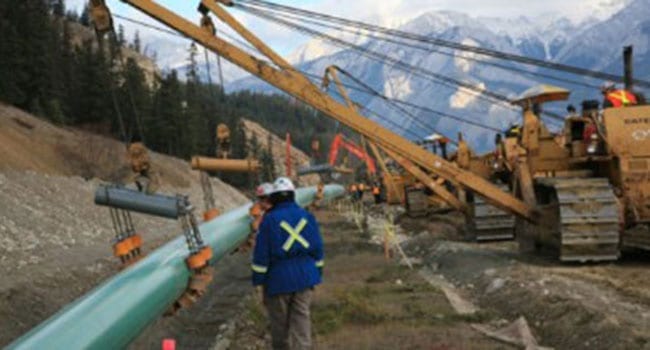 U.S. President Joe Biden’s torpedoing of the Keystone XL pipeline elicited a scathing response from several Canadian premiers.
U.S. President Joe Biden’s torpedoing of the Keystone XL pipeline elicited a scathing response from several Canadian premiers.
Canada frequently made the pipeline’s case through diplomatic and political circles in the months following Biden’s statement last May that: “I’ve been against Keystone from the beginning. It is tarsands that we don’t need.”
Is retaliation against the U.S. a possibility?
The idea recalls a 1959 movie starring comedian Peter Sellers, The Mouse That Roared. In it, the tiny nation of Grand Fenwick finds its only export, a gourmet wine, is now being produced by competitors in California. The economy collapses. The prime minister proposes that Grand Fenwick invade the U.S., then quickly surrender and claim war reparations. The Grand Fenwick army (25 men) then launches its invasion, with hilarious results.
We’re no Grand Fenwick but the costs of Keystone XL cancellation for Canada are indeed hefty. Alberta, for example, has invested US$1.1 billion of taxpayers’ money in the project. TC Energy and its contractors will be out even more billions. Thousands of jobs are lost in Canada. Participating First Nations also lose.
On the U.S. side, unions say it means lost jobs for more than 8,000 workers in three states and US$900 million in lost wages.
Our oil can be (and is) delivered to U.S. refineries by train. So, as of now, scrapping Keystone XL is an easy decision for the Biden administration, which has no issue with a long list of approved oil pipeline projects within its borders.
If there’s any hope for the project, it will be because of U.S. unions reminding Biden of his claims to be “a union guy” who will do more for them. And if U.S. Gulf Coast refineries can make the case that they need Alberta’s heavy oil and a pipeline is the best way to get it.
Canada’s pipeline pains cause no heartburn for Biden. Quite the opposite: cancelling Keystone XL helps to ensure the U.S. economy gets the benefit of sharply discounted Canadian oil for its refineries. Canadian oil can still reach American destinations by rail and other pipelines, and by road if necessary.
Biden has not said the U.S. will stop exporting oil. If its shale sector revives, it can become the world’s top oil exporter. Biden has no issue with this. U.S. oil in 2019 went to 190 countries, fetching global prices. (Some of it was actually our oil that went to the U.S. Gulf Coast at a discount and was re-exported, at a profit, by the U.S.)
Already at home we’re seeing green groups trying to pitch the federal government again to kill its Trans Mountain pipeline expansion project.
Don’t want Trans Mountain?
Then you don’t want massive investment into Canada’s clean-energy transformation. Canada lacks unlimited ways of getting money. Crude oil exports are our single most important way of getting it.
For decades, almost all Canadian oil exports have gone to one country, the U.S. – and at a big discount from world prices. We are, at least in oil-market terms, an economic colony of the United States.
So here’s the crunch: Canada needs Alberta oil to reach the West Coast so we can export it at world-market prices and bring the money home. The current Trans Mountain pipeline is jammed and month after month has to say no to shippers who want to send more oil through it. Hence the expansion project.
The pandemic has hammered our economy while raising the cost of health care. Government can’t just print money and run explosive deficits forever; we need private investment and exports. And some of that oil-and-gas export money will go to greening the economy.
If Canada’s goal is truly to decarbonize and diversify the Canadian economy, what will work is:
- stop giving away a premium product for less than it’s worth;
- fulfil the federal promise to complete the Trans Mountain expansion project;
- maximize the profits from exports and invest them back into the energy transformation.
That last point, incidentally, is a pledge the government of Prime Minister Justin Trudeau has already made.
Biden has exciting plans to transform the U.S. energy system. Good on him! Canada is way ahead and the U.S. has a lot to learn from us if us they care to get away from the politics. Among other things:
- Canada has a carbon tax, the U.S. does not;
- Canada has taken progressive steps to eliminate unnecessary methane emissions, the U.S. has not;
- Canadian oil producers have successfully lowered emissions in the production of their oil, the U.S. has not;
- Canada has net-zero legislation, the U.S. has not.
What we can do is offer our innovations in technology, policy, law and even thinking to our good friends to the south, because if ever there was a time they need it, it’s now.
Stewart Muir is executive director of Resource Works, a B.C.-based organization that promotes responsible resource extraction and transportation.
Stewart is a Troy Media Thought Leader. Why aren’t you?
For interview requests, click here. You must be a Troy Media Marketplace media subscriber to access our Sourcebook.
The views, opinions and positions expressed by columnists and contributors are the author’s alone. They do not inherently or expressly reflect the views, opinions and/or positions of our publication.


